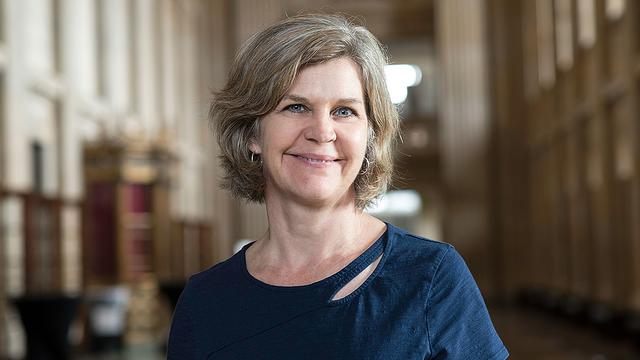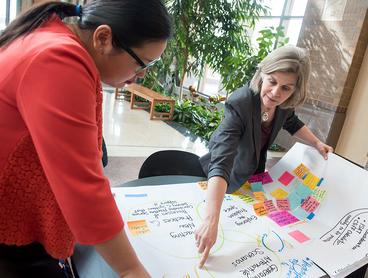An accomplished scholar in the study of social policy implementation and management, Humphrey School Professor Jodi Sandfort is taking on a new leadership role as she becomes dean of the Evans School of Public Policy & Governance at the University of Washington next month.
Since Sandfort joined the Humphrey School in 2006, she has focused on improving the design and evaluating programs focused on low-income children and their families.
To that end, in 2016 Sandfort founded the Future Services Institute, an applied research and training center that works with state and local government agencies and nonprofits to advance a human-centered design approach that keeps the needs and daily realities of struggling families and individuals at the forefront.
She also chaired the School’s leadership and management area for a decade; implemented civic engagement processes such as the Art of Hosting at the University of Minnesota and in the community; founded the Hubert Project, an international collection of multimedia teaching materials in public affairs; led the redesign of the Humphrey School’s mid-career masters degree into a cohort model; and co-authored Effective Implementation in Practice: Integrating Public Policy and Management (Jossey-Bass, 2015), an important text in the field.
“Dr. Sandfort brings to us a depth and breadth of experience that will propel the Evans School to new heights, and a clear vision of public service at a critical time in our history,” says University of Washington Provost Mark Richards. “The faculty, staff and students of the Evans School were greatly impressed with her leadership ability, and her commitment to equity and inclusion. We could not be more pleased to have her joining us.”
Sandfort says she’s honored to serve as the next dean of the Evans School, and considers it a logical step to take after her time at the Humphrey School.
“I’ve never been interested in other deanships before because the Humphrey School is so special. The only place I would have ever thought to go in the country is the Evans School because of its rigor and its focus on community engagement,” she says. Like the Humphrey School, “the Evans School is at a large public university and is a top-ranked public affairs program. The faculty there are really focused on doing rigorous research, but doing it in a relevant way and trying to have the university create value for the state and the region.”
Director Sook Jin Ong in 2018. Photo: Jayme Halbritter
Dean Laura Bloomberg calls this a "terrific opportunity" for Sandfort, and applauds her contributions to the Humphrey School over the past 20 years.
“Jodi has left a lasting mark on the Humphrey School community through her remarkable research and expertise in public policy implementation,” Bloomberg says. “In so many ways, Jodi is a role model for how University scholars can concurrently advance important academic work and equally important public service. I am confident she will carry this ethos with her as she assumes her leadership role at the Evans School.”
Sandfort’s colleagues and former students also praise her skills and abilities as a teacher, mentor, and leader.
“Dr. Sandfort is one of the great thinkers in the human-centered design space,” says PhD candidate Weston Merrick, whose dissertation examines how to reduce administrative burdens for people who live in public housing. “Through that approach, we’re not just studying the problem, we’re going to understand the problem better and actually make a change in the system to address it.”
Alumna Kate Erickson, who works in Community Services for the Minnesota Department of Corrections, took several classes from Sandfort while earning her mid-career Master of Public Policy degree and a Certificate in Human Services Leadership. Erickson describes her time at the Humphrey School as life-changing.
“Dr. Sandfort challenged me to think and reflect so deeply that it was uncomfortable, [and then to use] that discomfort for growth,” Erickson says. “[She showed me] that learning is not a singular event but a daily practice. I learned from her that I am deeply called to my career and my work. I went from being a well-meaning white woman to being actionable in attacking and deconstructing systemic racism, specifically within the corrections system.”
Professor John Bryson, a longtime colleague in the leadership and management area who recently retired, describes Sandfort as a “fearless innovator” in public affairs education.
“She is a forceful advocate for design-thinking approaches, engaged scholarship … and technology-assisted learning,” he says. “Jodi's deep care for public affairs education and research and service—all in one package—is really quite a model and is certainly the Evans School's gain.”
Top priorities
Sandfort has already identified a number of priorities that she is preparing to address when she arrives at the Evans School.
“We’re going to invest in technology-enhanced learning and host important community conversations,” she says. “We have committed to being an anti-racist public affairs school, which is ambitious because it has never been done before. Policy can improve society, but can also be used to exacerbate social inequity. Like at Humphrey, the Evans School is committed to facing that legacy and turning it around. We will create more pathways for young people to realize that public policy and implementation can be a calling for them.”
Sandfort is moving to Seattle shortly, where she’ll begin her new duties at the Evans School on January 15. She says, though, that the spirit of the Humphrey School will always be with her.
“My biggest lesson from the Humphrey School is to never compromise on the significance of higher education in supporting problem-solving of people in the community,” Sandfort says. "There's a philosophy called pragmatism that the Humphrey School embodies in the way we work, and I think of it as the next generation of policy schools. I'm proud to have the opportunity to bring those practices to the Evans School, another world class public university.”



